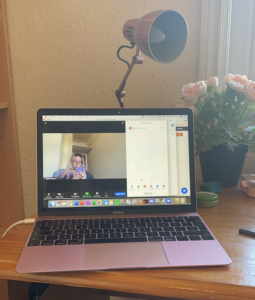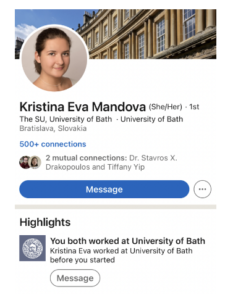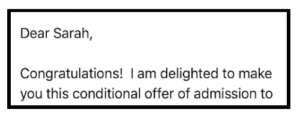When choosing which university and degree to apply for, you should be sure to check out the 'careers prospects'. These are the opportunities that studying for a specific degree at a specific university can give you for forging ahead in your future career. However, similar degrees across a range of universities can have similar career prospects.
Therefore, it can be useful to know a bit more about the different types of career-related services and resources available for students studying at a specific university, which is where this blog comes in.
As final year University of Bath students, many of my friends and I have found ourselves relying on the University's Careers Service for support and assistance whilst making applications for various graduate and job roles. The Careers Service has been instrumental in providing us with a range of support and resources throughout the application processes.
As a thank you to the Careers Service for all their help, I wanted to dedicate my last blog to them and provide information on the different types of career-related resources available for University of Bath students and how these resources can help improve your career prospects.
Unsure of what to do? Talk it out
Conversations about the future and careers can be challenging to navigate. Some people go into their degree knowing exactly what they want to do afterwards and continue to pursue that career throughout their university experience. Others, including myself, may have a vague idea of what they want to do but find this shifting throughout their degree. Then there are those who have no idea what they want to do, even in their final year.
All of these are valid positions to be in, and one thing that's so important is to not compare yourself to anyone else. Everyone has a different journey in life, and what matters most is you do what feels right for you. Regardless of your journey, you will be supported here.
One essential thing the Careers Service offers are appointments where you can discuss different ideas and thoughts you may have about your future career. These don't have to be concrete plans, but even just discussing which aspects of your degree you find the most enjoyable can be helpful to get you thinking about related careers. You may even find yourself learning about a career you had never heard of before. So, don't worry if you don't know what you want to do or what your next step is, because the Careers Service is here to help you out.
Beyond discussing future options, the Careers Service also provide a range of help for anyone who is going through any sort of application process. This includes full-time and postgraduate applications. These applications can be stressful to sort out, especially while you are still studying for your degree. However, the careers service offer a range of support throughout your application process.
1. Document help: making first impressions count
 The first stage in most job or post-graduation applications consists of two essential documents: your Curriculum Vitae and cover letter. For most applications, this is the first point of contact you will have for the company or university you are applying to. Therefore, it is definitely in your best interests to make sure these documents are truly the creme de la creme.
The first stage in most job or post-graduation applications consists of two essential documents: your Curriculum Vitae and cover letter. For most applications, this is the first point of contact you will have for the company or university you are applying to. Therefore, it is definitely in your best interests to make sure these documents are truly the creme de la creme.
Whilst most of us may have written a CV before for a part-time job, it is likely that you will have a few questions on how to make your CV genuinely captivating. I remember having questions like, “what information should I include where”; “how should I best format this”; “is this experience relevant if it was three years ago”, etc.
These are perfectly normal questions to have, and that’s exactly what the Careers Service is here for. They offer appointments where you can ask these questions and get the answers you require and offer talks on how to prepare a great CV. Therefore, with the help of the Careers Service, you will be able to ensure your CV is as strong as possible and you will be one step closer to securing that offer. 
Alongside your CV, you will often have to write a cover letter. For postgraduate study, this is a bit different as you have to write a statement of academic interest instead, although it's a similar concept. This is where you sell yourself and say what about the position you are applying for intrigues you.
The Careers Service at Bath offers the same sort of services for CV and cover letter help. Again you can book appointments to discuss your cover letter and go to talks on what makes a cover letter stand out against the crowd.
All of this help is important for improving your application and making sure you get through the first round of any application process. It is also really motivating to discuss your application and receive feedback on it. Therefore, the Careers Service will not just provide you with formal guidance, but they may also give you the confidence boost you need to send off your application and officially begin your future career.
2. Assessment and interview prep: from in-person to employed
The second stage of job applications is assessment centres and interviews. This is when your suitability for the job is tested in person. Not all applications require you to go to an assessment centre, however, for most, you will be interviewed. These interviews are crucial conversations between you and your future employers and/or co-workers. Here you will discuss the role, why you want this job and how suitable you are for this position.
As your first point of face-to-face contact, nailing your interview is essential to landing you the job offer. So it is vital that you are well prepared for any assessment and interview you have. The Careers Service has tonnes of resources available for anyone with an upcoming assessment and/or interview. They offer practice interviews, sessions on how best to prepare for assessment centres and interviews, as well as meetings where you can discuss what to say and how to best present yourself.
Going into an assessment or interview can be nerve-wracking, and so having this preparation and knowing what you are going to say can really help you deliver the best version of yourself to employers.
3. Online resources: from a profile to payroll
 In this modern day and age, there are more than just CVs and interviews required to forge a fantastic career. As the world turns to technology, so do employers. Fortunately, the Careers Service is tech-savvy enough to offer help in developing your online presence.
In this modern day and age, there are more than just CVs and interviews required to forge a fantastic career. As the world turns to technology, so do employers. Fortunately, the Careers Service is tech-savvy enough to offer help in developing your online presence.
If you are new to LinkedIn and are setting up your profile, making sure you include the right type of information in the right format can be crucial for getting you recognised within your field. The Careers Service offers appointments where you can go through your profile and decide what information and pictures to add to make sure that you stand out from everyone else. This way you do not even need to be actively applying for jobs to have employers know who you are and why they should hire you.
The Careers Service offers appointments where you can go through your profile and decide what information and pictures to add to make sure that you stand out from everyone else. This way you do not even need to be actively applying for jobs to have employers know who you are and why they should hire you.
Alongside offering help with your online presence, any University of Bath student can also access the MyFuture website. This is the Careers Service’s website, and it offers a whole host of different resources. From a job search bar to career service blogs to upcoming career events, this website is an incredible tool to help you start planning for your future career. The search engine shows different opportunities that can benefit you throughout your degree from internships to graduate roles.
The jobs you can find on this site tend to require less experience than graduate roles, so it can really help to find these types of jobs straight away rather than sifting through heaps of jobs that require five years of previous experience. This also allows you to get any applications in ASAP, which makes you appear more keen and interested in the role. Even if you are not looking for a job at the moment, MyFuture allows you to browse potential options which you may wish to discuss at a careers meeting.
4. Genuine career prospects as a University of Bath student
When deciding what university and degree to apply for it’s useful to look at all the resources that will be available to you. Any degree will make you more employable, so remember to look beyond the basics and find out what services will be available to help you secure the next position you need to start building up your career. As a University of Bath student, this includes having a degree from an internationally recognised university, previous experience especially from placement years, and support from the careers service whilst you make these applications.
Finally, the help does not end when you leave the Univerity as the Careers Service supports graduates for life! All of these factors give University of Bath students truly great career prospects and a secure chance of building an amazing career after graduating.
Respond




